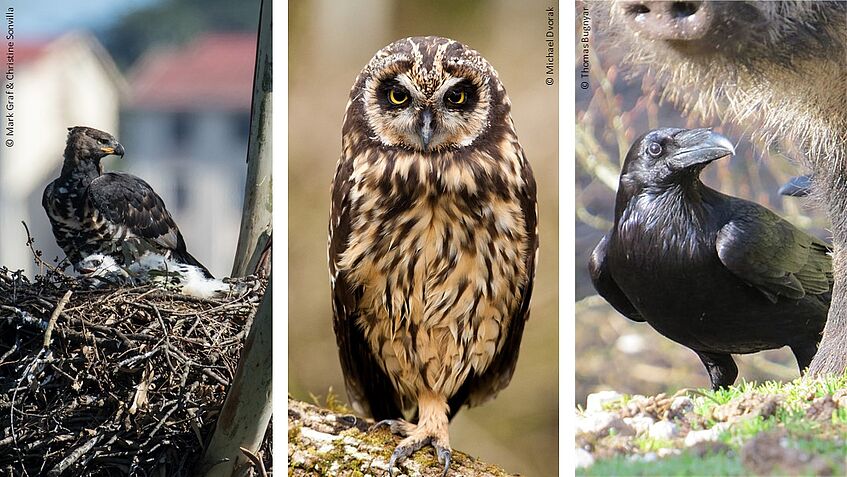Acceleration for Food
Project details:
Principal Investigator: Dr. Petra Sumasgutner
Funding: FWF Austrian Science Fond
Programme: FWF-START
Project Duration: 2023 - 2028
Project Number: Y 1486

Problem statement
Animal behaviour and energy expenditure change with increasing human activity and as the human footprint grows, and affect an individual’s fitness with cascading effects across trophic levels. Efficient foraging behaviour is essential for survival, yet can be difficult to measure in the wild, especially in predators and scavengers when hunting attempts are rare and foraging opportunities hard to predict in space and time. We face this challenge during the Anthropocene, when such information is vital to develop theory and apply conservation management approaches to protect biodiversity, and when predators and scavengers are declining faster than any other foraging guild. Direct observations of animals are limited by time and geographic scale, and are often influenced by human presence itself. While habituating wildlife to an observer is possible, it remains labour intense and requires long-term-studies that still have temporal and spatial limitations. Recent advances in remote monitoring of behaviour include tri-axial acceleration sensors (accelerometers) to measure body posture (static acceleration) and body velocity (dynamic acceleration). The recorded patterns allow interpreting which behaviour is shown when and where, and importantly correlate with energy expenditure.
Research plan
Animals tracked with GPS, to understand space requirements, and accelerometer, to understand activity patterns and other finer-scaled behaviours, can be used as passive sensors for change – while environmental perturbations such as human-induced rapid environmental change (i.e., land-use change and anthropogenic climate change), island-wide eradications of invasive mammals and the anthropause created by COVID-19 related lockdowns, provide research opportunities to disentangle underlying mechanisms. In this research project, we unravel mechanisms underpinning foraging behaviour and energy expenditure of different bird species in human-affected environments across avian foraging guilds by focussing on four challenging conditions that are not suitable for direct observations and thus require the application of novel (biologging) technology:
- scavengers and predators in rapidly changing environments that are less predictable (for focal animal and observer) and require quick behavioural responses to survive;
- interactive effects, that rely on big data to provide the necessary variance in all relevant aspects, for example in spanning an entire urban-rural habitat gradient or a temperature range that includes subfreezing and heat-waves;
- scavenger communities, when several individuals or species interact with one another that vary in their sensitivity to (human) disturbance and when hunting events providing carrion are unpredictable in space and time; and
- predator-prey interactions, when the targeted foraging behaviour is rare (i.e., hunting) and/or occurs at night.
Team
Collaborators:
AT Prof Thomas Bugnyar, Prof Sonia Kleindorfer (Konrad Lorenz Research Centre), Dr Shane McPherson-Sumasgutner (Skylines Raptor Research)
AT Bernhard Lankmaier (Cumberland Wildpark), Franz Schüttelkopf (Adlerarena Bug Landskron)
UK (University of St Andrews): Prof Christian Rutz, Dr Robert Patchett
US (The Peregrine Fund): Dr Chris McClure, Dr Ralph Buij
DE (Max Planck Institute of Animal Behaviour): Dr Matthias Loretto, Dr Kamran Safi
CH (Swiss Ornithological Institute): Dr Martin Grüebler, Dr Matthias Tschumi, Julia Hatzl
EC Dr Birgit Fessl (Charles Darwin Foundation | Galápagos Land Bird Plan), Paula Castaño (Island Conservation | Floreana Re:wild), Dr Paolo Piedrahita (ESPOL – Escuela Superior Politécnica del Litoral)
Vulture Conservation Foundation: Dr Franziska Lörcher, Dr Julien Terraube, Dr Juan Pérez-García
Contact
Dr. Petra Sumasgutner
Email: petra.sumasgutner[at]univie.ac.at
